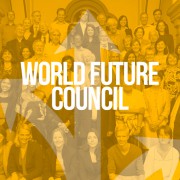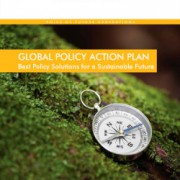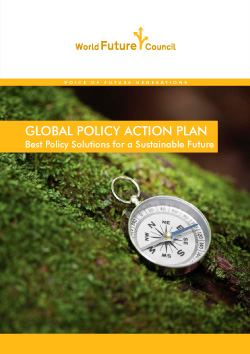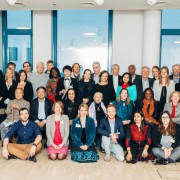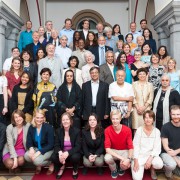World Future Forum 2016 – Opening Speech by Jakob von Uexkull
We may all be doing our best but, as Winston Churchill said: “In a crisis, it is not enough to do our best – we have to do what is necessary”. Today we are heading for unprecedented dangers and conflicts, up to and including the end of a habitable planet in the foreseeable future, depriving all future generations of their right to life and the lives of preceding generations of meaning and purpose.
This apocalyptic reality is the elephant in the room. Current policies threaten temperature increases triggering permafrost melting and the release of ocean methane hydrates which would make our earth unliveable, according to research presented by the British Government Met office at the Paris Climate Conference.
Long before that point, our prosperity, security, culture and identity will disintegrate. A Europe unable to cope with a few million war refugees will collapse under the weight of tens or even hundreds of millions of climate refugees.
While scientists are increasingly in a state of panic about the state of the environment, the media – prone to exaggerate other news – downplay catastrophic threats to the planet. When the London “Times” provided a realistic overview recently (15.04.2015), it felt obliged to include the phone number of the Samaritans for those feeling distressed after reading it. One wonders how the Samaritans dealt with those calls!
Last month, N.Y. Times columnist Paul Krugman, after noting that climate change “just keeps getting scarier” asked: “So what’s really at stake in this year’s (US) election? Well, among other things, the fate of the planet.” A study by the US National Academy of Sciences last year concluded that claims of “de-coupling” economic growth from growing CO2 emissions and resource consumption, i.e. that we can consume more and conserve more at the same time, have been based on false accounting, under-estimating the raw materials required to create the products counted. (The Guardian, 25.11.2015).
So why have we not already formed an emergency alliance to do everything humanly possible to stop and reverse course?
Why have we not identified a hierarchy of risks and developed a common narrative and strategy? These are questions I often hear, especially from the young, for whom the work of the World Future Council and its members provides rare hope that they still have a future.
Despite many challenges, the World Future Council (WFC) has achieved remarkable successes. Today it is widely acknowledged for its work spreading exemplary policies and the holistic perspective embodied by its members. As a result, to quote one of our partner organisations, the WFC has “outstanding convening power”.
The WFC has developed a remarkable sense for future themes. Even unorthodox proposals, such as money creation, the political representation of future generations, and 100% renewable energy targets are now debated in many fora. Our work has become an important reference point, both for popular authors, researchers and UN organisations. We have developed three iconic cross-silo projects: the Future Policy Award (FPA), the Future of Cities Forum (FCF) and the Global Policy Action Plan (GPACT).
Our world today is different from when we last met a few years ago. The basic argument has since been won. As a columnist in the right-wing British “Daily Telegraph” wrote recently (17.12.2015): “Whether or not you accept the hypothesis of man-made global warming is irrelevant. The (Chinese ) Politburo does accept it. So does President Xi Jinping…This political fact is shattering for the global fossil industry and the economics of energy”. What happened? The Himalayan glaciers and Tibet’s permafrost are melting, threatening key Chinese water supplies.
The coal lobby is already seeing the writing on the wall: “We will be hated and vilified in the same way slave traders were”, says the Secretary-General of the EU coal industry organisation (FT 16.12.15).
At the recent opening conference of the new WFC office in China it was very obvious that the Chinese authorities take the climate threat very seriously and are looking for solutions and partners.
Tragically, in the USA, this is not yet the case, with Donald Trump claiming climate change is a “Chinese hoax”. For, to quote the Wall Street Journal (03.08.2015): “If anthropogenic climate change is a reality, then that would be a huge problem only government could deal with. It would be a heaven-sent opportunity for the left to vastly increase government control over the economy and the personal lives of citizens.”
The myth that climate change is conspiracy to reduce freedom is spread by a powerful and greedy elite which has largely captured governments to preserve their privileges in an increasingly unequal world.
The real history of the past 40 years shows that the often disputed Limits To Growth report was prophetic, even for the USA: “The median US household income in 2014 was $50.000. If we had maintained pre-1970 productivity growth, it would have been $97.300” (FT 20.2.16).
As a result the USA is now facing a youth revolt, with young voters backing a socialist and more of them having a positive view of socialism than of capitalism (NYT 02.12.2015).
But in many ways this is a conservative revolt against an insecure future, opposed to the disruptions of recent decades, including globalisation, corporate “personhood” and the resulting un-affordability of their parents’ American dream.
The promised technological revolution does not excite them which is probably a good thing, for, to quote WFC councillor Rolf Kreibich, “there is not a single reference to sustainable development in the whole Big Data and Smart Data debate”. Techno-Stress is causing falling gadget sales, while in Japan, “people are becoming distrustful of technologies in a broad sense, as they are now often associated with fakeness and futility.”
The new “satori” generation, is anti-consumerist and looking for “enlightenment” (Baku Eye, May 2014).
They and their peers in Europe and the USA are “less likely to endorse the importance of democracy; less likely to express trust in democratic institutions.” (World Values Survey, 2015).
This is not surprising when policy-makers decide based on cost-benefit-analyses provided by economists, whose models are ideological, serving the interest of the privileged and discounting away the needs of future generations. Their tunnel vision fails to see that our economies depend on functioning ecosystems, whose collapse does not just destroy current GDP but the natural capital on which all future GDP depends.
Thus, their widely used DICE model calculates that, even a disastrous +4°C temperature increase would only reduce GDP by 4% and a +6°C increase reduce it by less than 10%, although predicted to make large parts of the planet uninhabitable. In such models, Africa could be gone but global GDP still increase…
No religious dogma is as powerful and dangerous as the dogmas of economists who assume that we will all become richer even on a burning planet!
This dangerous nonsense still rules and even the UN SDG strategy suffers from it. “Given the existing ratio between GDP growth and the income growth of the poorest, it will take 207 years to eliminate poverty with this strategy, and to get there, we will have to grow the global economy by 175 times its present size.” – an obvious impossibility. (Seeds of Change, Vol. 32, No.1, Jan-April 2016, p. 15) The SDG Goal 17.1 calls for more trade liberalisation and power for the WTO – although environmental threats mandate the opposite: boarder tax adjustments to stop environmental dumping.
How is it possible that we have lived so long according to this narrative which dis-connects us from our earth and now threatens our survival? In 1980 the US Heritage Foundation used the election of Ronald Reagan to impose the agenda still ruling the world, organizing 20 project teams involving 300 participants to develop policy recommendations for all government departments. These were published in a 1000 page book, “Mandate for Leadership: Policy Management in a Conservative Administration”. There was of course nothing “conservative” about the radical disruptions planned. But the recommendations were well argued, and many were implemented, as there was nothing available to counter them. To quote Margaret Thatcher: “Economics is the method: the object is to change the soul”. (Sunday Times, 01.05.81).
Today, even the business publication Forbes acknowledges that “Capitalism has… devastated the planed and has failed to improve human well-being at scale” (09.02.16). So the awareness has been raised and we now need a methodology how to end this devastation. While we do not have the resources the Heritage Foundation has accumulated, at the expense of people and planet, we will have many allies on the path to Earth Trusteeship and Earth Justice.
But we need to re-think what we have done so far, not because it is wrong, but because it is no longer a sufficient response to the Earth Emergency. Asked at a recent conference why she was talking about climate change and not about jobs, trade union leader Sharan Burrow replied: “Because there are no jobs on a dead planet!” The eco-industrial transformation will of course generate many millions of new jobs, but she understands the hierarchy of risks and dangers…
Our challenge is immense but not new. “There is nothing more difficult to take in hand, more perilous to conduct, or more uncertain in its success, than to take the lead in the introduction of a new order to things. Because the innovation has for enemies all those who have done well under the old conditions, and lukewarm defenders in those who may do well under the new” – to quote Macchiavelli’s ‘The Prince’, published in 1532.
As I said, we have many powerful allies
- our living planet which can still respond and recover if we change course before irreversible tripping-points are reached.
- the youth of the world who see that the promises of the current global narrative are hollow and are in search of credible alternative.
- the global unprotected who are realizing that, while the new world order claims to have no ceiling, it definitely has no floor.
- our ancestors who have put their trust in us to ensure that their lives and achievements have not been in vain
and
- all future generations of life on earth who are rooting for our success as we have the historically unprecedented power to decide if and how they will live!
The WFC Global Policy Action Plan (GPACT) is our manual for responsible leadership. It summarizes key policy recommendations for people and planet, now under threat from the consequences of the Heritage Foundation policies. It aims to replace the Washington Consensus – now increasingly rejected – with a new consensus, which may become known as the Hamburg consensus!
The fallacies and contradictions of the old narrative have been exposed and changes required discussed at great length.
We must now build new alliances, moving beyond the infighting, backbiting, bureaucracies, narrowness and jealousy so prevalent among NGOs and their supporters.
The WFC has shown that it has the ability to initiate new coalitions, not because we know more or better, but because we build on what the international community has already agreed to, but failed to implement. We work to close the gaps between inter-connected crises still treated as separate by activists and funders, the gaps between policy research and the advice required by policy-makers, the gaps between rights agreed, e.g. in the UN World Charter For Nature, and their legal implementation. As the defenders of privilege know (but we often forget), the devil is in the policy detail!
Many, in business and civil society, prefer easier to achieve voluntary self-regulation. The recent first global over-view of self-regulation proves them wrong, showing that in 82% of the schemes assessed, voluntary measures failed.
The level of protection delivered was much lower than a law would have delivered. A Welsh charge on plastic bags cut their use overnight by 80% while an English voluntary measure achieved a 6% drop in seven years… (The Guardian, 4.11.2015).
In many areas, legislation will be a challenge. The easy win-win scenarios are often a myth. The Climate Legacy Initiative concludes that the taxation required to lead to adequate demand reduction will cause “significant social pain”. Politicians fear their voters rebelling, yet need to understand that nature rebelling will be a more serious matter, for we cannot negotiate with melting glaciers or spreading deserts.
The acclaimed economist Dambisa Moyo laments “an erosion of productivity around the world”, which she cannot understand, describing it as “really weird”.
Considering the urgent needs of people and planet on the one hand and growing global unemployment on the other, this “weirdness” clearly has a cause, namely the perverse dogmas worshipped by Moyo and her fellow economists.
They claim that the now urgent reforms are too expensive, implying that we cannot afford to live on this planet. But whatever a society has the human and natural resources to produce, it can also finance. The WFC Future Finance team has, over the past two years, produced several ground-breaking reports exposing the ruling fallacies and how to remedy them.
First, we need real world accounting. The unused global renewable energy potential wastes trillions of dollars annually. Yet, while every coal mine closed is lamented as a waste of industrial capital, the immensely larger destruction of natural capital caused by not maximising renewable energy production has been ignored – until the WFC calculated it.
Creating (“printing”) new money by central banks to save the financial system was quickly accepted. Yet funding the urgent transition to sustainable and regenerative societies in the same way, has been a political taboo, until the WFC showed last year how this can be done to fund the production of new goods and services: 100% renewable energy, retrofitting buildings, sustainable transport systems, etc. – also generating millions of jobs in the Global South, reducing the pressures to migrate in order to survive.
Our shared future requires a cohesive plan for step-by-step policy reform and the WFC GPACT is the first attempt to design one – not the usual endless wish list, but a priority policy instruction manual, building, wherever possible, on national and regional policies already working, analysed by us, according to the principles of Future Just Lawmaking already agreed by the international community.
GPACT summarizes the minimum policy reforms required to build a world where solutions can again grow faster than problems. It aims to enable such a world, not pretend that we already know all the solutions. As Martin Luther King said, laws do not move the heart, but they restrain the heartless – those who have built the dictatorship of the present benefitting them at the expense of the future of life on earth.
GPACT sets out the path and the milestones to a sustainable future:
1. Environmental Education
We have identified the best law – from Maryland, USA – and are now working to spread it.
We have also identified the best programmes to teach environmental literacy in business schools and to students of economics (see futurepolicy.org).
2. Revitalising democracy
We are have identified and researched the exemplary Icelandic law, which ensures that private money cannot buy elections. Spreading this will be a huge exciting challenge.
3. Adopting alternative progress indicators
Again, a small country, Bhutan, took the lead. The EU BRAINPOoL project, in which the WFC participated, shows the way ahead. We also need to reform accounting standards and mandate longer time horizons for credit rating agencies.
4. Ensure the political representation of the needs of future generations
The WFC played a key role in building the exemplary Welsh legislation, based inter alia on the experiences of the pioneering Hungarian Parliamentary Ombudsperson for Future Generations, WFC Councillor Sándor Fülöp.
5. Ending crimes against future generations
We have identified pioneering judgments and the obstacles facing their implementation.
6. Re-direct military spending and foster a culture of peace
The WFC Peace and Disarmament Commission has produced a handbook on nuclear disarmament policies for the Inter-Parliamentary Union (IPU) and initiated a broader security debate by highlighting the links between climate and nuclear risks. It has also brought the Argentinean programme for the surrender of firearms to Bosnia.
7. Incentivize the shift to 100% renewable energy production
The WFC’s unique role in spreading best policies, especially feed-in-tariffs, is widely recognized, and has included over 100 hearings with parliamentarians from over 50 countries.
8. Regenerative Cities
Our best policy programme has been presented to decision-makers in Europe, Africa, the Middle East and China and we are now preparing to introduce this at Habitat III.
Our new office and credibility in China offer exciting possibilities. There are now exemplary Chinese laws, e.g. ensuring that profits from falling oil prices are retained by the government to fund conservation and anti-pollution measures.
9. Preserve healthy eco-systems
Ocean acidity is now increasing at ten times the highest rate during the past 56 million years. We must strengthen and spread the Law of the Sea, as well as the exemplary other ocean, forestry and biodiversity laws from Palau, Rwanda and Costa Rica, which we have honoured with the Future Policy Award.
10. Green tax reform including carbon taxes
We must shift taxation to what is bad and scarce. Good policy examples can be found on our special website for policy-makers, futurepolicy.org. We also work to spread policies which ensure that our financial system enables real wealth creation and no longer favours speculation and debt.
11. Liberating enterprise
Human ingenuity and risk-taking must be incentivized to serve the common good. Benefit corporations (Maryland, USA), the TOP Runner programme (Japan) and the Cradle-To-Cradle design principles provide examples ready to be replicated.
12. Protect the vulnerable
During the unavoidable chaotic transition now coming, it is vital that we protect children, women and the large and increasing numbers of persons with disabilities worldwide. The WFC has identified and honoured and works to spread exemplary policies for the right to food (Belo Horizonte) and child safety (Zanzibar Act), to protect women and girls against violence (2014 FPA winning policies) and abolishing barriers for persons with disabilities (Zero project/ WFC policies).
The benefits of tackling these inter-connected challenges jointly are obvious. But while the WFC can bridge policy implementation gaps, the bottom-up pressure on policy-makers must increase to help them to withstand the lobbyists of the status quo.
We are now working to find the resources and allies to initiate – to quote Naomi Klein “a spasm of rapid-fire law-making, with one breakthrough after another”.
The moral revolution which ended slavery was not achieved just by petitions, nor will the transformation now urgent be won by General Twitter and Admiral Facebook. You cannot fight massively entrenched power with statistics or appeals to reason alone. Our opponents are poisoning our common well – a capital crime for our ancestors.
To quote the US PR expert Frank Mankiewicz: “The environmentalists are going to have to be like the mob in the square in Romania (which quickly ended the Ceaucescu dictatorship) before they prevail.”
We also need to project a powerful and attractive vision of our shared future as earth citizens, in a world of scarce resources. It will be a world of “fewer car races and more dancing competitions” (Chandran Nair), but a vibrant and flourishing world of education, arts, music, research, sports, spiritual quests and social interaction. My biologist grandfather envisaged that in such a world, life’s meaning would not “be sought behind the objects but behind the subjects”.
Today, the WFC stands at a crossroad. Do we and can we grow up to our potential?
The choice is up to each one of us. History has knocked very loudly on our door. Will we answer?
